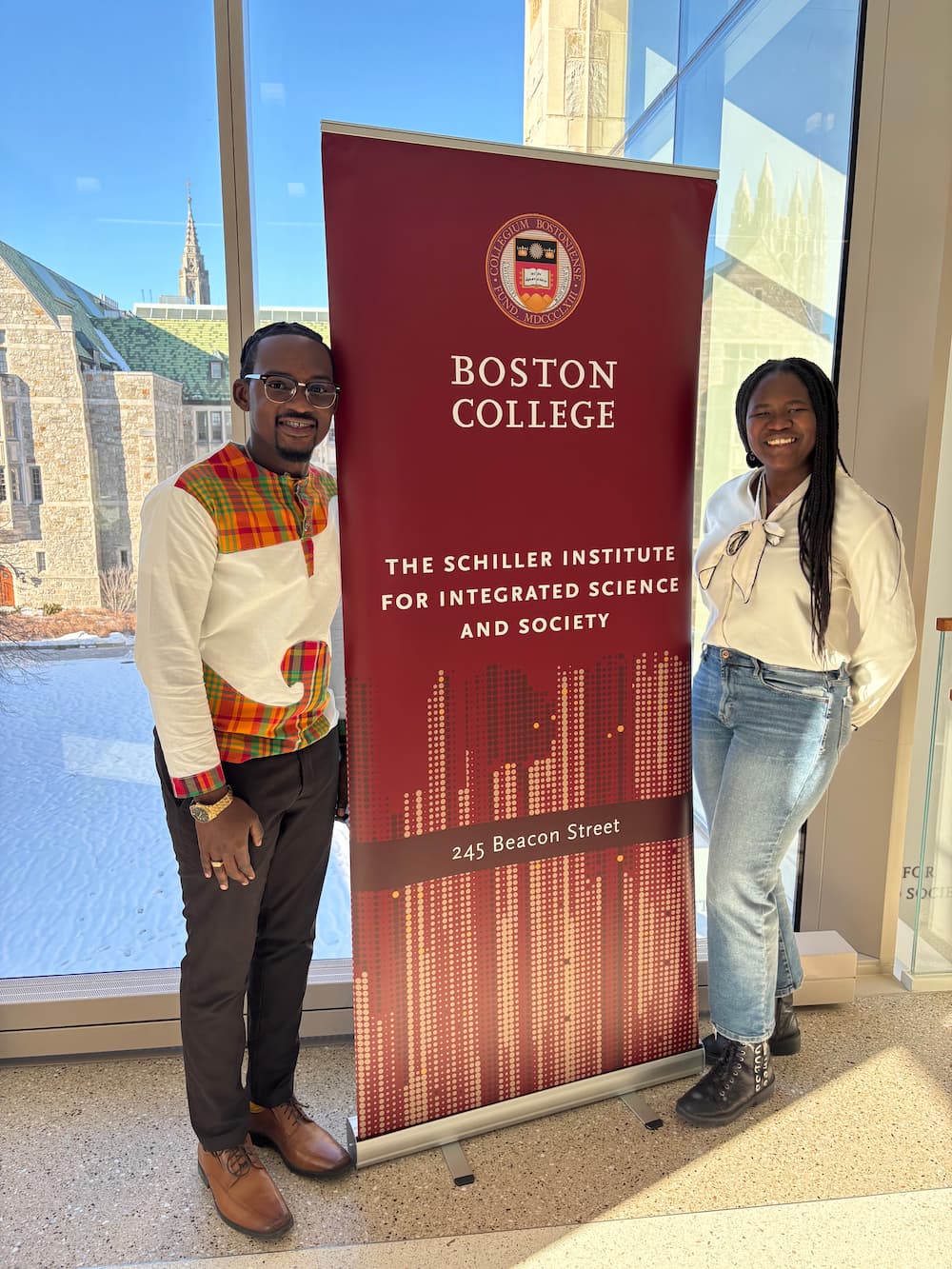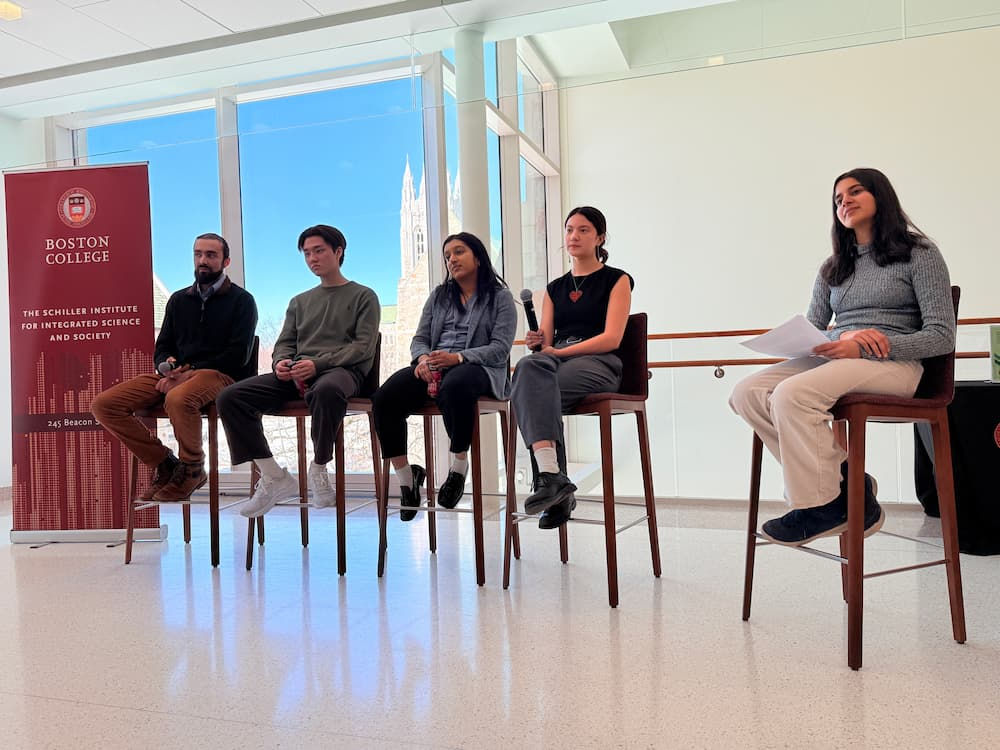COP 29 Symposium spreads word from Baku to BC community
By Stephanie M. McPherson | March 2025
In November of 2024, Boston College and the Schiller Institute sent a delegation of 18 students, faculty, and staff to Baku, Azerbaijan to take part in the 29th Conference of Parties to the United Nations Framework Convention on Climate Change. On Feb. 21, 2025, members of that delegation and more spoke at a symposium at 245 Beacon to share their perspectives and the lessons they learned during their time abroad.
Comments from the delegates throughout the Schiller-hosted symposium focused on how youth voices can be a source of power and optimism in uncertain times.
“This is a moral imperative. People are dying,” says Lyann Tam, a senior Global Public Health major. “Coming from a Jesuit institution and a place of privilege, we all need to speak up more about it and bring voices to that. And I think the louder we are, the more that trickles into where it matters in the negotiations.”

While in Baku, the delegation connected with Esquire Henry, CARICOM Youth Ambassador for Antigua and Barbuda, and invited him to speak at February’s symposium.
“When it comes to climate change and the operations of the globe in general, we are the ones that are going to be surviving and living in the world. And if not us, our children,” Henry said in a keynote address. “We are not just leaders of the future, but leaders in the present.”
In sending a yearly delegation of students to COP, Boston College and Schiller are supporting the growth of such leaders. Educating a diversity of students on the myriad issues at play in climate change mitigation and adaptation opens minds to what’s possible in advocacy and career paths.
“Schiller Institute values interdisciplinary studies. And I think that's what makes our COP29 delegation special,” said Junsoo Chung, a junior Economics and Environmental Studies major and Schiller Student Board member. “We had people from public health, law, business, engineering, philosophy, a lot of different backgrounds coming in with different perspectives and expertise and maybe even values."
Such a diverse cohort shows students what is possible when they embrace the intersection of their interests.
“If a person who is studying architecture attends a climate change conference, then they can begin to process in their mind, ‘Hey, I can begin to build infrastructure that can support the collection of water. I can begin to build infrastructure that can be green-space friendly. I can build an infrastructure that will survive the impacts of hurricanes and other natural disasters,’” said Henry.
Many varied perspectives were necessary to fully appreciate COP29 – it was the self-proclaimed “financial COP” focusing on details surrounding disbursement of funds to mitigate climate disasters. With so much talk of money and statistics, it was important to have delegates who could sort through the jargon alongside students who could keep sight of the fact that each statistic referenced represents a person or a community, real lives and livelihoods being affected around the world.
.jpg)
Some of the students arrived with idealistic hopes for far-reaching progress but got to see first-hand the complications involved in coming to equitable solutions. For example, students in the symposium’s panel noted that while all countries were ostensibly equals at the negotiation table, equal power didn’t always manifest.
“Technically yes, everyone has an equal standpoint, but when you have leverage over smaller nations, whether it's your food systems, water sanitation, things like that, it becomes a lot harder to make the power balance equal,” said Elizabeth Schwab, a senior Communications and International Relations major who was presenting a poster on carbon markets at the symposium.
The intricacies of the negotiation process were also eye-opening. In many cases, all parties had to agree unanimously on every bit of a legal agreement, with debates over the uses of single words, such as acknowledge versus recognize in the text.
“The conference really solidified how much power you can hold if you understand the fiscal agreements and the language of it,” says Schwab. “It reaffirmed and pushed forth my passion for climate justice, specifically with human rights.”
COP29 was held just after the United States election. This affected the tenor of many conversations and negotiations and had many changing their plans to account for the shift in US leadership. Chung, who is from South Korea, noted that policies in his home country surrounding carbon credits are shifting to align with EU regulations, rather than those of the US.
“It was really interesting to see how some countries and businesses and organizations are pivoting their strategy or adapting to this new political landscape,” said Chung. “Those changes tell me a lot about how the US election results have a ripple effect in the global economy.”
Despite the disappointments the students encountered, they came back to Boston College energized and ready to continue the fight. Carly Morris, a second-year law student, recalled attending a meeting of all delegates who had come from the United States led by John Podesta, the Senior Adviser on International Climate Policy under the Biden administration. Podesta had a hopeful message about the future.
“Right now, we have a president coming in who doesn't take these things seriously, doesn't agree with the rhetoric at the conference,” paraphrased Morris. “That being said, hopefully only a four-year term, hopefully there will be plenty of people still willing and able to rebuild after.”
The main takeaway from attending COP29 seemed to be that government agreements are not always reliable and deals that are made can be modified. And so, change must be driven by individuals and civil society. Conferences and speeches only make up about 20 percent of what an advocate does, said Henry.
In his keynote, Henry challenged students to use their momentum from the conference to make a local impact – starting with spreading what they learned in Baku to the rest of the campus through efforts like the symposium. Examples of his and his colleagues’ efforts include wetlands education, making cement blocks out of invasive seaweed, and engaging local kids in agriculture.
But he emphasized that it doesn’t have to be as resource intensive as running a major project or initiative. Educating family, neighbors, or peers is just as important.
The BC delegation has already put in the work outside of the symposium. One delegate, MBA student Ahmed Ferjani, spoke to members of his company about what he learned at COP. Schwab has joined YOUNGO, the youth network under the UN FrameworkConvention on Climate Change. Morris has used her COP experience to make connections across campus through many programs and ages.
“The real advocacy comes from the work that you put in,” said Henry. “And that really highlights that anybody can become an advocate once you choose to make change in a very small way. Together we can make a massive impact.”



